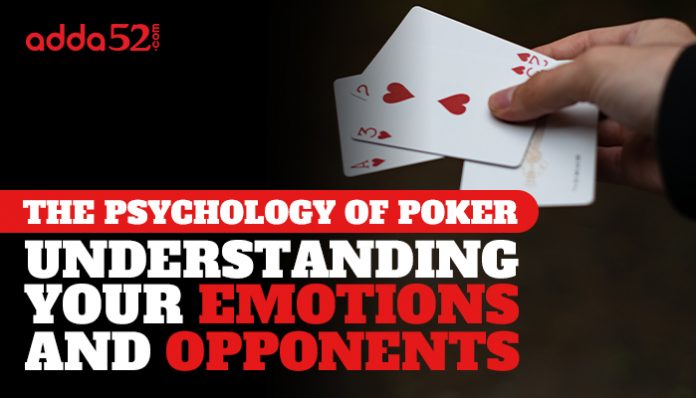Poker is a game of skills and psychology, where your ability to read your opponents and manage your emotions can be just as important as your knowledge of the game itself.
In the game, players are often faced with incomplete information, as they cannot see the cards their opponents are holding. As a result, they must rely on other cues and signals to make informed decisions about their next moves. This is where understanding human psychology becomes necessary. By observing the behavior of their opponents, players can glean valuable information about their playing style, their tendencies, and their overall approach to the game.
Different players may have different reactions to the same situations. For example, some players may become angry or frustrated when they are losing, while others may become more focused and determined. By reading these emotional reactions, players can adjust their own play accordingly, taking advantage of their opponents’ weaknesses and avoiding their strengths.
Reading Tells
A key aspect of human psychology that is relevant to poker is the concept of “tells.” Tells are physical or verbal cues that players give off that can reveal information about the strength or weakness of their hand. For example, a player who is holding a strong hand may be more confident and relaxed, while a player who is bluffing may be more nervous and fidgety. Understanding these tells can give a player a significant advantage in the game, as they can use this information to make better decisions about their own play.
Play Mind Games
Another important aspect of human psychology is the concept of “mind games.” Mind games are the psychological tactics that players use to try to throw their opponents off their game, such as bluffing, misdirection, or intimidation. By understanding the motivations and intentions behind these mind games, players can better defend against them and even use them to their advantage.
Profiling
One technique for reading your opponents is profiling, which involves categorizing your opponents based on their playing style. For instance, a tight player is someone who plays very few hands and only bets when they have a strong hand, while a loose player is someone who plays many hands, often with weaker hands. By categorizing your opponents, you can adjust your playing style accordingly, making it easier to predict their moves and react accordingly.
Emotion Control
In addition to understanding the psychology of their opponents, successful poker players must also be able to manage their own emotions and psychological state. This is known as “emotional control,” and it is a critical skill for any poker player. In the heat of the game, it can be easy to become emotional or irrational, which can lead to poor decision-making and ultimately, failure. By understanding the psychology of emotions, you can learn to manage your own emotional responses and maintain a clear, rational mindset throughout the game. You must remain calm and composed throughout the game and not let your emotions get the best of you. Deep breathing and visualization techniques can be helpful in managing your emotions.
Pulling off a successful bluff
Successfully executing a bluff in poker requires careful planning and execution. Here’s how your understanding of psychology can help increase your chances of success:
Choose the right opponent:
The success of your bluff depends largely on your opponent’s ability to read your moves. You need to look for players who are less experienced, more likely to be intimidated, or who tend to overvalue their hands.
Build a credible story:
When bluffing, you have to make your story as believable as possible. This means paying close attention to the cards on the table, and creating a narrative that makes sense given the information available.
Use reverse psychology:
Sometimes, the best way to sell a bluff is to do the opposite of what your opponent expects. For example, if you have a weak hand, you may want to act confidently or aggressively, which can make your opponent think you have a strong hand.
Time your bluff carefully:
Timing is everything when it comes to bluffing. You should only bluff when the pot is large enough to make it worth your while, and when the other players are less likely to call your bluff.
In conclusion, understanding human psychology is important in poker because it can help players to develop better strategies and approaches to the game. There are lots of players in India who play Poker online regularly and make good money. But becoming a successful Poker player requires training and practice. You have to learn how to study the behavior of successful players and analyze the outcomes of different Poker hands to understand what works and what doesn’t. You can then implement this knowledge on the real cash game tables to quickly develop your game plan and improve your chances of winning.
How to play Poker online for real money
If you’re a beginner, it’s essential to start your Poker journey by learning the basic rules and strategies of the game. You can start by playing free poker games online, where you can practice your skills without any financial risk. Once you’ve gained some confidence, you can move on to play poker online for real money.
In India, online Teen Patti and Tash game are popular variants of card games. You can find many online platforms where you can play these games for real money. However, before you start playing, it’s essential to learn the hand ranking and betting rules.
When playing online Teen Patti or Tash game, it’s important to find a reputable online platform to ensure that your money and personal information are secure. You should look for online platforms that are licensed and regulated, offer a wide variety of games, and have a strong reputation for safety and security.
On Adda52, you can play the highly entertaining Poker games and take advantage of instant sign-up bonus poker offers, deposit deals, loyalty benefits, referral rewards and much more. All you need to do is to install the Poker app and create an account to enter the mesmerizing realm of card games.


